Friday, 06 September 2024
I may be biased but I find it easier to spot sustainable fashion boutiques in smaller cities with a university than elsewhere, and Göttingen is no exception.
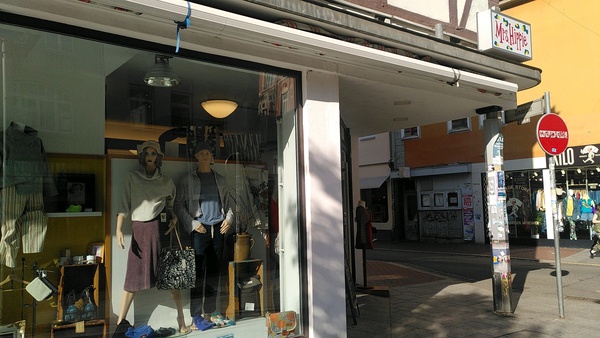
It's the only West-German city with a branch of the colourful
Mrs. Hippie chain (the other branches are in Dresden, Erfurt, Leipzig and Magdeburg). As the name suggests, colourful loose-fitting comfort fashion made from fibres of natural origin dominates the shop. The prices here are moderate, but to be affordable for smaller purses the shop makes compromises: While fabrics made from organic cotton or linen are available, there's also a lot of viscose (usually not made with the eco-friendly lyocell process). Recyclability (which would require mono-materials) is not in the focus (many pieces contain rayon/elastane), but sustainable production, preferably in Europe, definitely is.
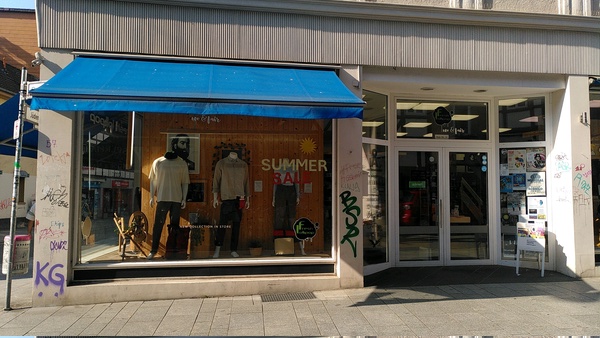
If sustainable brands are important to you, you'll find a lot of both, established and less known brands at
Fresh Lollipop. All pieces here are fairly produced, both, with respect to the working conditions of the growers of natural fibres, the producers of the fabrics and the textile workers. The fabrics are either mono-materials, recycled and/or certified organic, to work into the direction of cradle-to-cradle processes. In the few cases where polymere mono-materials are used in washable textiles, only new PE and nylon is used to minimise microplastics abrasion in the washing machine. Apart from clothes and shoes for all sexes, bags, rucksacks and other accessories are being sold on two floors.
There's a second shop in Kassel.
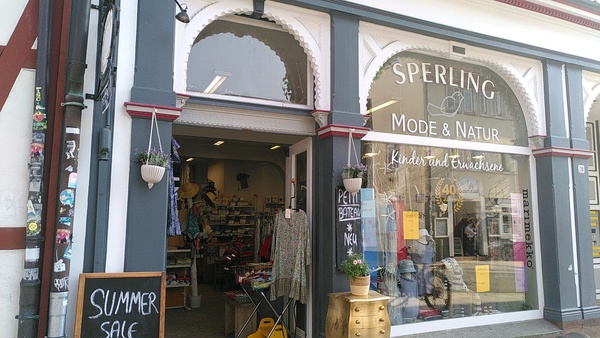
For organic clothes for babies, toddlers and younger children simply cross the street where you find
Sperling Mode & Natur. The crammed, yet cosy shop has a long history: It was established in 1983. It also sells a small selection for women and uni-sex accessories. If you come with smaller kids, there's a small table where they can draw and colour.
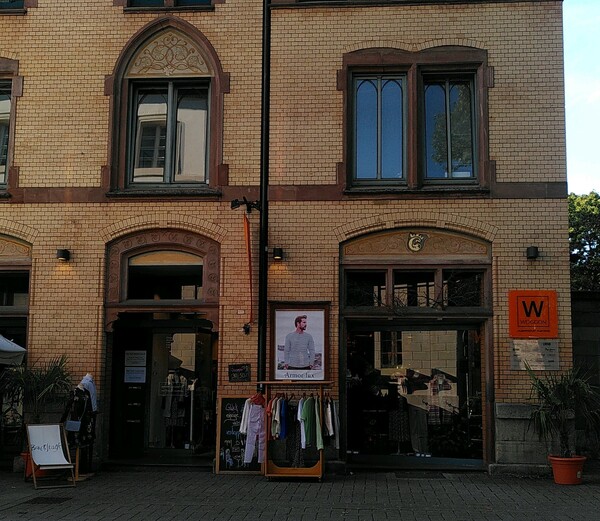
Whether you are generally prefering long-lasting artisanal (and as a consequence more expensive) clothing made from natural materials of highest quality or simply like to spend time in a carefully curated boutique for the distinguished bourgeois, take a break at
Woggon. Clothes, shoes, bags and other accessories are beautifully presented in a wood-and-brick showroom with a beautiful staircase, everything nicely arranged with carefully choosen details: a book here, a typewriter there. The service is impeccable, and as another customer exclaimed: "It's difficult not to buy a nice thing here." The shop also serves as a beautiful venue for concerts and readings.
Long-lasting clothes from natural fibres, often organic and often made from mono-materials can be found at the outlet of the Freiburg-based sustainable web and post order shop Waschbär – at least until October, 31st 2024 when the shop is going to be closed.
Fairly traded accessories and jewellery of beautiful and long lasting quality can also be obtained from the Contigo fair trade boutique.
2024-09-06 22:30:00
[Goettingen, Erfurt, Dresden, Leipzig, Magdeburg, organic, fashion, shoes, fair, shopping, gifts]
[direct link · table of contents]

Thursday, 05 September 2024
Little is more comforting in the warm season than a stroll with an arisanal ice-cream in a wafer cone. Unfortunately this fairly innocent pleasure has almost become a luxury due to the significant increase in price we've seen in the past years. In the inner city of Göttingen a scoop of ice-cream made from organic milk comes at 1.90 EUR in 2024.
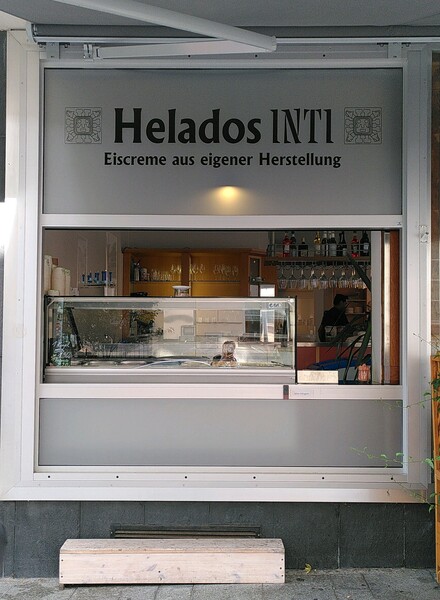
My favourite comes from
Helados Inti, the ice-cream bar of Café Inti, next to the Bioladen in der Burgstraße which is less sweet than its competitor. Apart from the usual flavours they offered a delightful cottage cheese ice-cream. Needless to say that they also offer several fruit sorbets as a vegan option. You should however don't come (too) late: By 10pm the staff will have prepared everything for closing, and the ice-cream seems to disappear first.
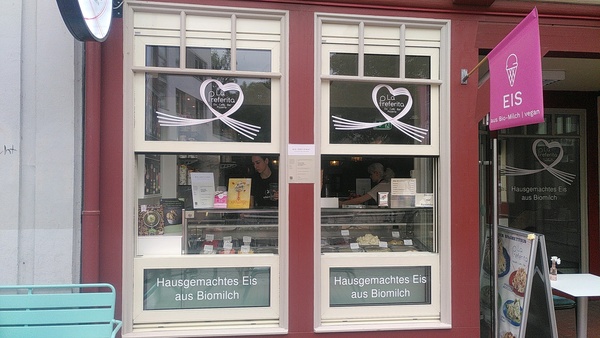
While nothing at the "Helados Inti" shop hints the use of organic ingredients, the
ice-cream shop of the
Preferita pizzeria cum cafe
in the Kurze-Geismar-Straße pedestrian zone proudly advertises the use of organic milk. However, without this I wouldn't have guessed the main ingredient was organic as the flavours are not allowed to speak for themselves but are drowned in sweetness, and the flavouring agents are definitely not organic. However, the ice-cream doesn't seem to be "enhanced" with "magic powders". In additions to the milk-based ice-creams there are vegan fruit varieties. The cafe itself offers organic juices and even an organic amaro.
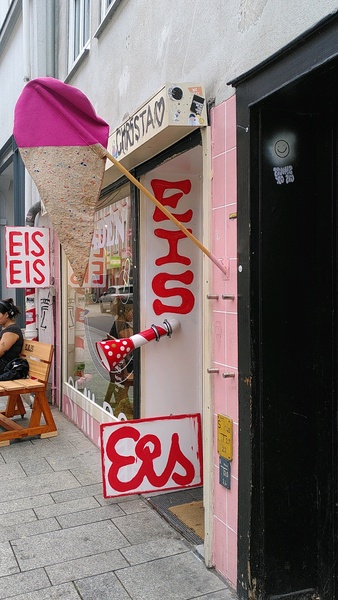
Next to St. Nikolai church opposite the "Weltladen" a small almost invisible ice-cream parlour offers "ice-cream from [whitespace] milk". The whitespace grasped my attention, so I asked the owner who hesitatingly hinted that not only the milk but also the sugar would be organic. However, since his shop dubbed
Smiles doesn't have an organic certificate he isn't allowed to advertise this. He seemed to have experienced an unpleasant situation with the authorities related to the attribute that in the past had filled the void.
His ice-cream comes in unusual flavours like "something with fruit and ananas" or "orange biscuits". It's 10 cents more expensive than the shops described above and also a little too sweet to my taste. But the red-white whisper phone at the entrance is worth this little extra! It leads to a plastic playground booth inside the shop where children are invited to play ice-cream seller and receive the "orders" via the phone.
2024-09-05 22:00:00
[Goettingen, organic, ice-cream, vegan]
[direct link · table of contents]

Sunday, 01 September 2024
Every organic supermarket big enough to be equipped with a freezer will sell you iced-lollies or pre-packaged cups of ice-cream, at least during the warm season. But for the real thing you need to know where to find your small scale artisanal organic ice-cream parlour. Fortunately there are sufficient options to find your favourite one, unfortunately only a few of them sell their fare in organic wafer cones. The covid-19 pandemic introduced ice-cream seasons starting as early as February (e.g. at the Bartu shops and True & 12 at the Gasteig), often restricted to nice spring afternoons, but usually you can expect the ice-cream to appear at the beginning of April.

Arguably the best ice-cream in town is made by former shoe-pusher Thomas Bartu and his crew in Schwabing – and the best: Unlike all other ice-cream parlours they run their shops the entire year around. Just like the best ice-cream parlours in Italy they cover their 24 types of ice-cream hygienically instead of displaying them for show-off. All ingredients are listed on big and nicely layouted wallpapers, leaving no questions open for vegans or people with allergies. Children under 13 years pay less (1.70 €) for the scoop than adults (2 €). You can also have a good (though not organic) cup of Italian-style coffee or an organic soft-drink, and a yummy organic pizza. If you haven't had enough you can choose from an ever changing selection of Bartu ice-creams to take away in reusable containers. And the best: They don't close their shop during the cold season. On the other hand don't count on opening hours longer than the regular 10 pm; in fact they often close about ten minutes before.

Summer 2018 saw the opening of a second Bartu ice-cream parlour in the Maxvorstadt. The nicely styled cafe – with tables and all – is located next to the Gratitude restaurant. If you fancy a caffe affogato (Italian espresso with ice-cream) have it the Italian way, with Fior di latte instead of vanilla ice-cream. They also serve organic tea, soups and soft drinks, and since the covid-19 winter of 2020/21 you can also have a one-pot organic lunch. Fortunately the the wafer cones are back, so are no longer inclined to produce waste. Although the shop is closed on Mondays and Tuesdays during the cold season you may be lucky on nice weather Mondays and Tuesdays in spring when the shop nevertheless opens at noon.
While Thomas Bartu occassionally extends his sales with various pop-up stores he doesn't seem inclined to expand his business into a chain. So here was a niche which Stefano di Giglio of Del Fiore tried to fill: He and his team started with three gelaterie at once in 2017, of which only one was left by 2021. You'll find it in Schwabing, near the university quarter's entrance to the Englischer Garten, and I am inclined to say that it is run by independent owners.

Di Giglio seems to concentrate on ice-cream making for local third-party vendors like
organic supermarkets and cafes. In the summer of 2021 I found the NY-style Occam Deli in Schwabing to sell Del Fiore ice-cream to passers-by, and since 2022 the tramstop cafe
Il Chiosco at the Ostfriedhof graveyard has not only been beautifying an ugly crossroad of Tegernseer Landstraße, but allowing for an organic ice-cream while you wait for the tram.
Both, the milk-based flavours and the sorbets, are fully organic and extremely palatable, though quite pricey. Il Chiosco concludes the ice-cream season at the beginning of November.
A stroll along the Isar river to the Western shore of Wittelsbacher bridge gives you another opportunity for a partially organic ice-cream stop: The ChocoLab cafe cum chocolaterie at Baldeplatz is not organic in general, but the dairy ice-cream sold here is made from organic milk.

Where would you expect organic and vegan ice-cream to go if not in the university quarter? A two-minutes walk from the Northern exit of the tube station "Universität" in the Maxvorstand neighbourhood you'll find IceDate serving date and cashew-based ice-cream varieties. I prefer their strong flavours like the chocolate varieties or coffee; the more subtle ones like hemp or green tea often need polishing.
A scoop goes for 3 EUR in 2024, and every serving is topped with a small quantity of an additional flavour. Bad weather is no issue since they have a pleasant indoors sitting area.
Amid the covid-19 spring of 2020 a second branch opened next to the Tushita tea house, in humming Glockenbachviertel, and
a mobile IceDate booth can also be found on many street festivals in the city.

In the neighbourhood of Haidhausen you have three possible targets: Cosy though buzzing Café Reichshof a five minutes brisk walk from Ostbahnhof station offers home-made ice-cream spring through early autumn, though you may be tempted to indulge yourself in one of their gorgeous cakes instead (or have both?)
The stuccoed ceiling with candelabras play well together with the wooden shelves of the bakery display, making for an inviting yet not overwhelming interior. During the warm season you may prefer to sit outside facing relaxing Bordeauxplatz. Be prepared to queue on nice-weather days, but since the service is swift, efficient and friendly waiting will usually take shorter time than expected. The Neulinger's ice-cream season ends in October. A single serving goes for 2.50 euros in 2024, with a small discount for each additional flavour, served in organic wafer cones.
As the shop participates in the Hey (formerly Brot am Haken) campaign you may buy a coffee, bread or cake voucher for someone in need. If you buy a coffee drink to take away in your own or a Recup cup you'll get 10 cents off for sparing the environment
In November 2019 the entire location underwent major work to re-establish the coffee house of old on the premises of the former bakery workshop (the work is now done in the new facilities at the wholesale market area of Sendling), resulting in a true jewel. Spacious and family friendly, in the tradition of the great coffee houses of the 1920ies it's a recommended hideout, both for breakfast, lunch, weekend brunch or a coffee break. Due to shortage in staff the cafe is self-serviced: Order and pay at the counter and fetch your order from there.

Café Reichshof is not the only branch of Bäckerei Neulinger, an artisanal organic bakery: There are two older shops in the neighbourhood of Neuhausen and a new cafe cum bakery located in the former meat-packing district, the Schlachthofviertel. In 2018 the Neulinger family moved its "headquarter" from Neuhausen to Sendling, to the premises of a former banana ripening facility –
a light and quiet place to have lunch while watching the bakers working the dough. Have an ice-cream on top as you leave. Since 2022, all Neulinger shops have been open on Sundays and public holidays, though the smaller shops only in the morning, for breakfast rolls.
For a very special treat step by Oliver a few steps from Café Reichshof at the south-eastern end of Bordeauxplatz: freshly prepared hand-rolled vegan organic ice-cream.
If you fancy an ice-cream during your evening stroll head for fancy True & 12 opposite the Gasteig cultural centre. Their milk comes from a family-run organic farm keeping grass-fed cattle half an hour away by urban train (plus five minutes by bus plus half an hours walk). Other ingredients like hazelnuts and eggs are also organic,
the non-organic ingredients of course all natural. The lip-smacking delicious result comes in original flavours like lavender and cassis (dubbed "Haidhausen") as well as standard flavours like chocolate or vanilla, both of unusually high quality. The scoop goes for 2.40 € in 2024 (saffron with rose water and pistachio. for 3 €). For an additional euro you will be served in a hand-rolled cinnamon-flavoured cone or shell, so ask for availability! To much regret also this place is closed from end of October to mid of March.
In Neuhausen organic ice-cream to go can also be had from Café Ruffini, described in my restaurant post.

The classical Italian ice-cream parlour – ice-cream to go, and not much ado – you'll find with Gelateria Artefredda in Giesing near Ostfriedhof on busy Tegernseer Landstraße. The right-hand side of their display features their organic varieties for 2.20 EUR the scoop – about eight ones to choose from. With its unpretentious eco-styled walls the cafe makes a light and pleasant place to have a short coffee break (prepared with organic milk). Most sundaes can be had with organic ice-cream, but unfortunately neither fully organic nor in re-usable cups. Artefredda keeps closed during the cold season. On bad weather days they often open up a quarter of an hour past their announced opening time, nice weather provided they will often keep open longer than announced.
Their ice-cream season usually stops with the German national holiday October, 3rd. From mid of October, 2023 the shop is hosting a cinnamon roll pop-up store,
the Zimtschneckenfabrik, offering all natural artisanal cinnamon rolls, cakes and sourdough bread and rolls Tuesday though Saturday 12–approx. 18 (until sold out), and on Sundays 12–15. Whether they use organic ingredients I did not have the opportunity to find out yet.

Not far away, a five minutes walk downtown from Giesing Bahnhof station, a new modern ice-cream parlour opened its doors on the premises of a conventional one in 2021: GelatOk! promises all natural ice-cream, with as little organic life-style as possible for an audience that does not usually frequent organic supermarkets. The milk for the creamy and exceptionally tasty ice-cream however is organic and comes from the Berchtesgadener Land dairy, and if you order a coffee drink, it's made with organic milk, too. Another good sign for the ice-cream is that it is produced in small batches – most of the containers weren't filled to the brim.
In the Glockenbach neighbourhood you'll find Das Eismeer, Munich's first self-proclaimed climate-neutral ice-cream parlour. Although the egg-free ice-cream here is all natural the main ingredients like sugar and milk are not organic. Single organic flavourings like vanilla or poppy seeds are however advertised in big letters so that you may get the impression that the entire ice-cream was organic. Looks a bit like a dark pattern to me. If you fancy a hot drink: coffee and cocoa are both organic (and the latter also fairly traded).
Kids pay less for the ice-cream than adults.

In the Western neighbourhood of Pasing you may set out for a stroll to Sweet Monkeys. Next to the graveyard, tucked away between a stonemasonry and a flower shop the clean and pleasantly decorated ice-cream parlour serves lip-smacking ice-cream made from organic milk from the Berchtesgadener Land dairy and veges from the nearby organic gardener Florian Kamlah. Not all ingredients are organic, but there's a commitment to avoid transport by buying local and energy emissions by using sustainable energy. This ice-cream shop offers some unusual flavours like cucumber-pineapple, white coffee or lime yogurt and you can also order sundaes like the children's favourite spaghetti ice-cream (spaghetti-like pressed vanilla ice-cream with berry sauce). Unfortunately the place is too far from the Pasing train station to be reached while waiting for a connecting train.
There's a second branch in Moosach.
Markets and street festivals
If you happen to attend a street festival in Munich like the semi-annual Streetlife on Leopoldstraße or the annual Munich Sports Festival on Königsplatz watch out for a pink-blue food truck selling Cramer's Speiseeis in cones. The Cramers run a family-driven organic bakery cum pastry shop in Gauting near Munich, where they also make their ice-cream, so be brave when you're in the vicinity and give their spicy ginger or chocolate-chili varieties a try.
While there's no more organic ice-cream at the Viktualienmarkt the weekly Saturday farmers' market at the Seehaus within Englischer Garten has a heart for those with a sweet tooth: During the summer monthes the Biohof Butz does not only sell organic fruits and veges, but also ice-cream made from milk by the farms' own cows.

No more ice-cream
When you take a stroll about the famous Viktualienmarkt food market the desire for an ice-cream may come natural. Unfortunately the
Trübenecker organic fruits and veges booth does no longer offer organic ice-cream in the summer – instead you can have freshly made all-organic smoothies.
No longer organic
Ceased to exist
The following places do no longer exist, even though you still might find references to them on the web:
- Amorino, Schützenstr. within front of Karstadt department store
- Amorino, Wiener Pl.
- Ella Bartu within Eis, Eisbaby installation by Daniel Man in front of Lenbachhaus art museum, Luisenstr. 33
- Bartu c/o Feinkost Käfer, Prinzregentenstr. 73
- Bartu ice-cream & Brenner Kitchen, Feilitzschstr. 4 (pop-up mobile ice-cream booth)
- Del Fiore Gelato Gärtnerplatz, Gärtnerpl. 1
- Del Fiore Gelato Roecklplatz, Ehrengutstr. 18
- Jack&Eddy's, Pestalozzistr. 7 (organic frozen yoghurt)
- Naturale Bio Eisdiele, Winthirstr. 9b
2024-09-01 16:00:00
[Munich, Haidhausen, Giesing, Moosach, Pasing, Schwabing, organic, vegan, ice-cream, coffee, cafe, Italian, bakeries]
[direct link · table of contents]

Thursday, 22 August 2024
Forget about sushi, pizza, pasta, burgers, curries and other globalized commonplaces – in Dresden it's much easier to find hearty home-cooked dishes made from locally sourced ingredients rooted in local and regional food traditions. This does not necessarily mean German – mind you that the borders with Czechia and Poland are close, so many menus reflect influences rather from Eastern than Western or Southern European cuisines.
Many dishes include meat, yes, but all the places I am covering here have a decent selection of tasty vegetarian options readily available.
Old town
A few steps from the Altmarkt, just across Kreuzkirche you'll find Cafe Aha which is covered here. Longer west, facing the modern building of the University of Music in Schützengasse you may be surprised to find a small island of baroque buildings with a wild garden, housing the city's environmental centre, and a great disappointment: The cosy rustic wholefood restaurant on ground flour dubbed Brennnessel ("stinging nettle") once used organic ingredients and still can be found listed as an organic restaurant, but alas! – no more.
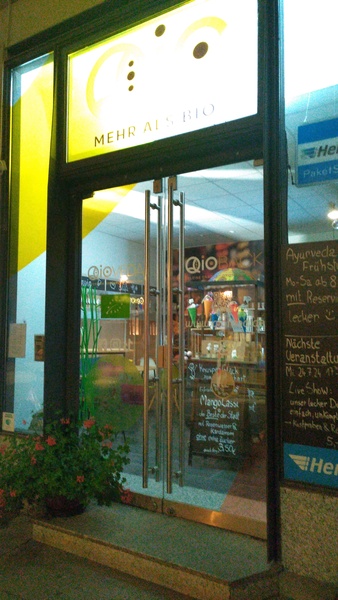
For a filling ayurvedic lunch or snack a few steps from the tram hub Pirnaischer Platz pay a visit to the
Qio bistro, in the vicinity of Cafe Aha. The place is a add-on to a small organic snack bakery – needless to say that you can buy their vegan sweet and savoury crackers made from legumes instead of wheat here alongside with a range of teas and other organic food items. On prior notice they also serve ayurvedic breakfast. So far I haven't had the opportunity to eat (or have a coffee) here, so let me know what you think.

Neustadt
For rustic food and surroundings head for one of the oldest independent pubs in town, the Planwirtschaft ("planned economy") in the Neustadt neighbourhood, popular since its beginnings as an illegal pub in the late GDR. On mezzanine level they serve breakfast, lunch and dinner as well as coffee and cake while the basement houses a pub which opens in the evening. When it comes to their supplies they focus on buying from local farms and enterprises as the (unfortunately not organic) independent butcher's directly across the street or a tea shop next door from which they also source the organic teas on offer. The goat cheese is always organic. They used to have an organic meat dish (which was marked as "bio" on the menu), but unfortunately no longer. My vegan dish of the day (celeriac in a hearty plum-fragranced sause with polenta and green salad) was absolutely tasteful. Have a tasty organic apple cider or beer, and ask about organic ingredients.

Young German kitchen is the promise of the Lila Soße ("purple sauce") gastro bar within the eccentric
Kunsthofpassage with its small boutiques and lovely places. Apart from daily changing main courses (most of them meat or fish, and often with an Italian touch) you can order tasty German "tapas" to your liking – warm, cold and sweet – served in a glass as well as dips and bread. None of the courses are fully organic, but many ingredients are, and chances are high that you can combine cleverly if you ask. They offer organic softdrinks, but no organic alcoholic beverages.
Out of town
If you take the urban train number 2 from the Neustadt train station, either on the way to the airport or to a stroll in the woods of Dresdner Heide, get off Bahnhof Klotzsche (one stop before the airport) and have breakfast, lunch, tea or a snack in its 110 years old railway station. Since the folks of Vorwerk Podemus took over and restored the historical building in 2015 it has been home to a bicycle shop, an artist's studio, an organic supermarket, and the now fully organic station restaurant dubbed Bio-Bahnhofswirtschaft with its pleasant beergarden.
Travellers and ramblers may be glad to hear that they can fetch an organic breakfast or packed lunch on the go, though
unfortunately not on Sundays as the restaurant is closed that day.

The vineyards on the slopes of the river Elbe around Dresden form Europe's smallest, most northern wine region, and fortunately the Saxon state winery of Hoflößnitz in Radebeul turned organic. The small town located west of Dresden on the northern shore of the river is famous for the writer of travel fiction, Karl May and its Museum of North American Indian Culture and can be reached easily, both by urban train, tram no. 4 and bicycle. Follow the Elberadweg cycle route on the southern shore, cross the bridge at Niederwartha and turn back east on the northern shore cycle route through Radebeul until you find signposts pointing to the vineyards on the hill.
The Hoflößnitz winery has a small self-service restaurant, the Hoflößnitzer Weinterasse, with an outdoor seating area shaded by horsechestnut trees from where you have a great view over the grapewines and the valley while tasting the local wines. All wines, but not all the food are organic: Your best choice is the "Winzerplatte" – home-made white bread with pickles, a little salad and a number of spreads of your choice of which the bread and the vegan spreads are organic.
There's also a small museum with information on all Saxon wineries and a wine shop where you can buy their products, mainly white and sparkling wines. Stick to Hoflößnitz for organic ones.
No longer organic
In 2012, when the
Mensa U-Boot ("submarine") on the campus of the Technical University on the campus of the Technical University was opened after major refurbishment work
it was re-opened as a fully organic students' refectory offering
one vegetarian and one omnivore meal at a very competitive price. All food and drinks at that time were certified organic. Unfortunately this is no longer the case in 2022: Given low frequent visits during the Corona pandemic the staff decided to not prolong their organic certification and turn to cheaper ingredients.
Closed
The following places ceased to exist, although you still may find references to them on the web:
-
Lilisou, Louisenstr. 58 (vegetarian, burgers, soups, curries)
- Lingner, Lingnerpl. 1 (German, international)
-
ElectricLotus, Louisenstr. 58 (vegetarian, ayurvedic, Indian)
- Abutheke, Alaunstr. 68a (Middle-Eastern)
- roots, Hauptstr. 35 (vegan fast food)
- Wurzelküche, Alaunstr. 11 (vegan)
2024-08-22 17:00:00
[Dresden, Radebeul, Elbe_cycle_route, Elberadweg, Neustadt, vegan, organic, coffee, lunch, dinner, snacks, restaurant, pub, wine, beergarden]
[direct link · table of contents]

Wednesday, 21 August 2024
If you are familiar with Johann Sebastian Bach's Coffee Cantata from around 1735 you've heard about the Saxonian citoyens' love for coffee and a good piece of cake (if heading for a local speciality, try the Eierschecke cheese-cake). With a pinch of irony people will talk about the famous Saxonian "Bliemschenkaffee" ("(little) flower coffee") referring to the thin coffee or caffeine-free coffee substitute during World War II or in the households of the poor. The term refers to the fact that you could see the flowery ornaments on the ground of the (well, not in all cases) Dresden china coffee cup.
The Saxonian's love for coffee hasn't faded since, they still proudly refer to themselves as "Kaffeesachsen" (coffee Saxonians), and most organic supermarkets will serve you a latte or Italian style coffee, both to have on the spot, and to go (in this case don't forget your refillable cup).
There are however more pleasant places for a chat with friends, some reading or working time with a delicious cup of coffee.
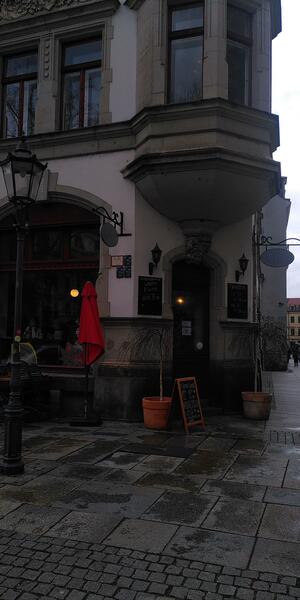
Neustadt
My favourite day cafe for about seven years, with friendly service and a huge display of gorgeous cakes and pastries, Die Kuchenglocke in Wilheminian Neustadt unfortunately closed in summer 2022. Run by the son of
Dresden's first (and to my knowledge only) organic bakers and one of the first organic ice-cream makers in Germany it revived the
tradition of Viennese style coffeehouses in the city. In 2022 he took over the
Heller bakery, and the cafe had to close. In March, 2023 it re-opened as Café Glocke, and apart from the interior decoration, not much has changed: You can still/again have (and buy to take out) cakes and coffee, and have gorgeous fully organic breakfast(all day long) and lunch. When the weather is nice take the chance to sit outside at the beautiful, comparatively quiet square around Martin Luther church.
The price for a (vegetarian) breakfast, sweet with pancakes or a croissant, savoury e.g. with hummus, roasted veges, bulgur and other spreads, is around 20 EUR but since the servings (especially of the savoury types) are quite generous, you may decide to share as long as you're not on your own.
On weekends it is advisable to order a table in advance as the place usually is quite crowded at that time.
The bad news: Effective February 2024 the place stopped accepting cash. Since the Oswaldz cafes have never been accepting payments without data tracking, the number of non-discriminatory organic breakfast and lunch places with a sense for data privacy are alarmingly diminishing in town.
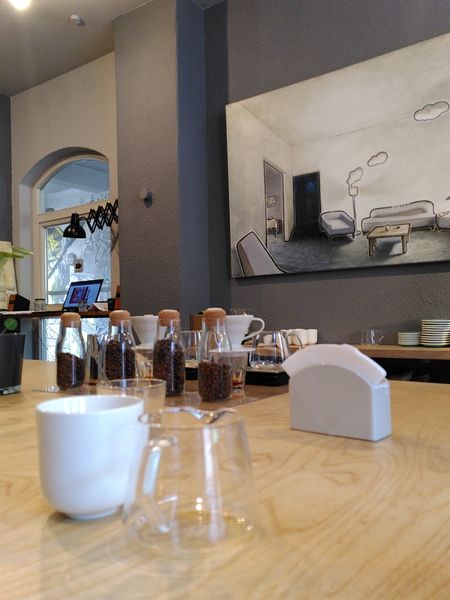
Not far away, on Bautzner Straße, you will find Phoenix Kaffeerösterei, a small-scale coffee roaster cum coffee bar furnished in coffee-coloured wood – ideal for the recreational sip of Italian style coffee. Their coffee is fairly traded, yet not organically certified, although they had organic coffee when they started up in 2006. The milk for a latte or New Zealand style Flat White however is organic. Mind you that their opening hours are quite restricted, usually to Fridays and Saturdays, but they often keep closed on Saturdays, too.
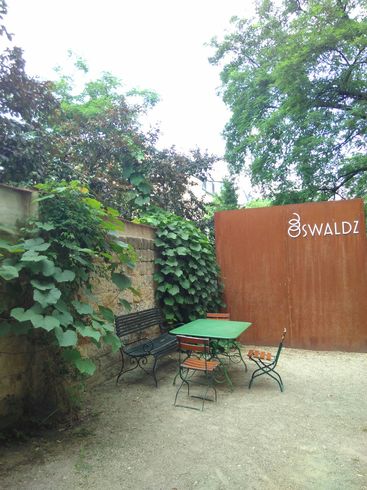
A ten minutes walk west, just before you reach Albert-Platz you can taste the Phoenix coffee all week long at the Oswaldz, a crowded coffee house cum gallery run by an ambitious young team. Before you sit down fetch a service number and put your order at the bar where you can choose from an impressive list of coffee drinks, among others a galao (coffee and milk frozzed together) or a gibraltar (double espresso macchiato). The milk they use is locally sourced and organic. You can also have a sandwich or cake partially made from organic ingredients – eggs and cottage cheese are organic, flour and fruit are not, and since the friendly staff happily answered my questions I'm sure they will equally friendly answer yours. During the warm season they open a pleasant backyard for their guests.
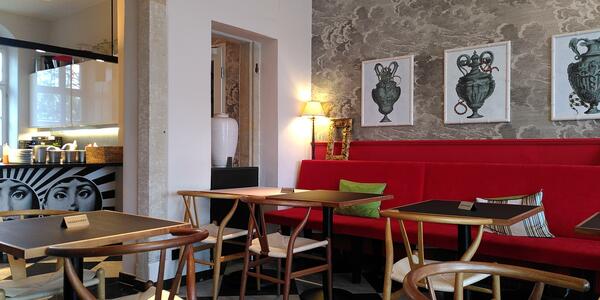
In 2023 Oswaldz rented a second shop next door and turned it into
serviced Oswaldz Breakfast Place.
All food for both, the cafe and the breakfast restaurant are prepared in its open kitchen while the coffee drinks are made by the baristas at the cafe. The menu is the same for both places as is the privacy-unfriendly decision to refuse payments in cash.
During the warm season there's a third Oswaldz place, the
Os2 – Café am Fluss.
Unfortunately there's no organic coffee place inside the Bahnhof Neustadt railway station, but if you have sufficient time you may leave the station building at the rear (Northern) entrance and head for the friendly self-service cafe cum bistro of the VG supermarket Friedensstraße for both, breakfast, lunch (try the hearty Soljanka soup if available), a snack, coffee or travel provisions.
Old town
Facing Kreuzkirche on Altmarkt with its white-washed interior one of the few places where the wounds of the Anglo-American bombing by the end of World War II still are visible you will find one of Dresden's first organically certified eating places, cafe cum restaurant Aha. Some years ago they quite controversely decided not to prolong their certification in support of uncertified local farmers following organic or near-organic principles. More than 75 percent of the ingredients they use are still organically certified but they stopped (probably enforced by law) to make this transparent, so you have to enquire on specific ingredients if you care.
The cafe itself is equally popular among students, families and NGO groups. Its walls frequently serve as a gallery for local artists, and the daily menu often reflects and extends the exhibitions. The list of coffee drinks is long, ranging from oriental and Indian inspired spiced coffee to the ubiquitous espresso.
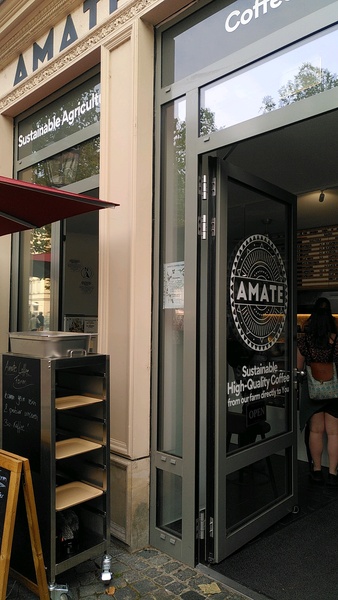
The cakes are delivered by the Heller family, but you can also enjoy hearty home-made meals throughout the day (til late), or simply help yourself at the salad bar located under the stairs. Breakfast is being served from 9 am. In the basement there's a well assorted
fair-trade shop
which cannot follow the restaurant's liberal opening hours and is closed in the evenings and on Sundays.
In the maze of tourist restaurants around the Neumarkt place with iconic Frauenkirche you'll find
Amate Coffee Farm, an inviting coffee place with pleasant outdoor seating serving organic coffee drinks made from directly and fairly traded Mexican coffee. The menu also offers organic softdrinks, but as my time here was very brief I couldn't ask the staff whether the cake was organic, too.
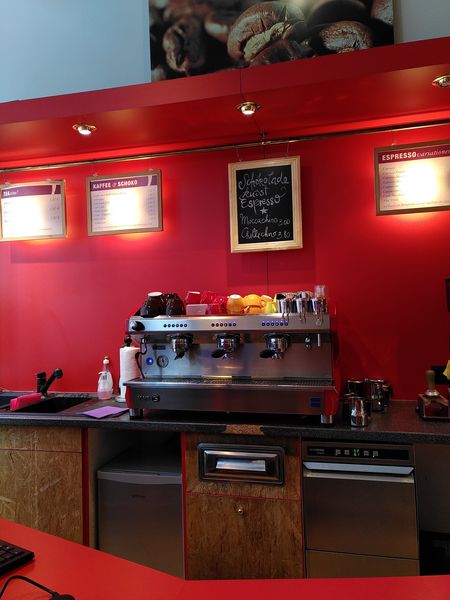
If you have to spent time in the vicinity of Dresden's central train station, Hauptbahnhof, pay a visit to another fair-trade shop, the Contigo at the Southern end of Prager Straße. Inside the shop there's an organic coffee bar, perfectly suited for the quick espresso in between, or while you're shopping for gifts, fairly traded artisanal work like bags and jewellery, tea, chocolates or coffee. They do not serve food, so you shouldn't come hungry. If you prefer an unconventional coffee drink opt a coffee based lemonade dubbed "Selosoda".
When the Contigo store is closed ignore the Starbucks branch at Wiener Platz and turn
instead to the
Haferkater porridge cafe facing it. The Berlin-based franchise concept can be found in several German main train stations by now, and the one in Dresden is open on weekends and generally until 8pm. While all prepackaged Haferkater products are organic no promise is made when it comes to the fresh food and drinks, so you'd better ask. Also, ask for returnable cups and bowls if you don't bring your own.
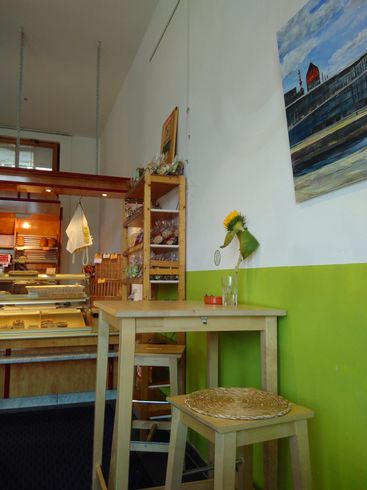
Dresden-Mitte
Not far from Bahnhof Mitte train station and the College of Music the organic co-operative VG runs a self-service Bistro & Backladen – the bistro to the left, the cafe to the right of the entrance. While the lunch is prepared in the open kitchen of the bistro right at the spot, the bakery shop simply sells the cakes (and bread) from local organic bakeries both, to take away and to eat right here in the pleasantly decorated shop room prided with pictures of local artists. Unfortunately the coffee comes from a smale-scale automatic machine – no real enjoyment, but drinkable due to the good ingredients.
While the bistro closes at 7pm on weekdays the cafe operates until 8 pm, but choice will be limited the later you'll come.
Near the Blaues Wunder bridge
A visit to the finest bridge in town, the Blaues Wunder ("blue wonder") steel construction can easily be combined with a visit to the arguably finest Viennese-style coffee house in town, the Café Toscana. Observing the bridge and the river you can sit in the winter garden having an organic coffee drink or tea. Your organic latte will be poured together at your table. While a selection of soft drinks and wines, the milk and breakfast eggs are all organic none of the gorgeously looking cakes and confectionery to be ordered from the sales desk are, at least not fully (enquire about what's tempting you). The history of the coffee house named after a Saxon princess customer dates back to the end of the 19th century. Since its re-privatisation after Germany's re-unification it has been run by the Eisold family, a local baker's family now in its third generation.
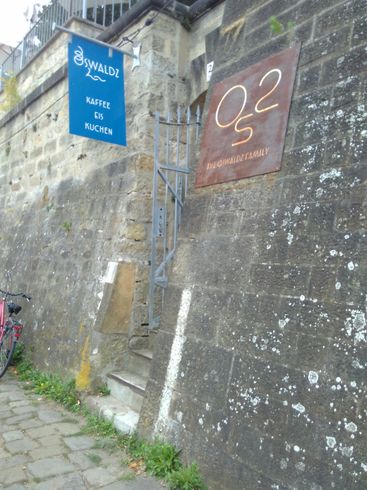 Crossing the blue wonder bridge you'll reach Körnerplatz, and if you fancy a stroll along the river shore, turn left into historical Körnerweg which leads you towards the city centre along the embankment. A 15 minutes walk on the way you'll find Os2 – Café am Fluss, a summer cafe run by the Oswaldz owners serving coffee drinks with organic milk, organic soft drinks and cakes to passers-by on weekends during the nice season. Most seats are located outside providing a beautiful view over the river and the city's silhouette. As at Oswaldz order at the bar inside, find yourself a seat, wait to be served and pay before you leave. The bar room also serves as an art gallery.
Crossing the blue wonder bridge you'll reach Körnerplatz, and if you fancy a stroll along the river shore, turn left into historical Körnerweg which leads you towards the city centre along the embankment. A 15 minutes walk on the way you'll find Os2 – Café am Fluss, a summer cafe run by the Oswaldz owners serving coffee drinks with organic milk, organic soft drinks and cakes to passers-by on weekends during the nice season. Most seats are located outside providing a beautiful view over the river and the city's silhouette. As at Oswaldz order at the bar inside, find yourself a seat, wait to be served and pay before you leave. The bar room also serves as an art gallery.
Leubnitz
If you ever happen to strand somewhere between the tower blocks of Prohlis and the Technical University, take the time to visit the city's only organic bakery and confectionery, the Bio-Bäckerei und -Konditorei Heller mentioned afore – if only to have a wonderful ice-cream on the go. When the weather is nice they also have a small outdoor terrace for you to have a coffee and cake or snack.
Although the bakery is open on Sunday mornings it's closed on public holidays.
Closed or no longer offering organic options
The following places ceased to exist, although you still may find references to them on the web:
2024-08-21 20:00:00
[Dresden, Neustadt, organic, coffee, breakfast, lunch, snacks, fair, cafe, ice-cream, restaurant, confectioners]
[direct link · table of contents]






























 Crossing the blue wonder bridge you'll reach Körnerplatz, and if you fancy a stroll along the river shore, turn left into historical Körnerweg which leads you towards the city centre along the embankment. A 15 minutes walk on the way you'll find
Crossing the blue wonder bridge you'll reach Körnerplatz, and if you fancy a stroll along the river shore, turn left into historical Körnerweg which leads you towards the city centre along the embankment. A 15 minutes walk on the way you'll find